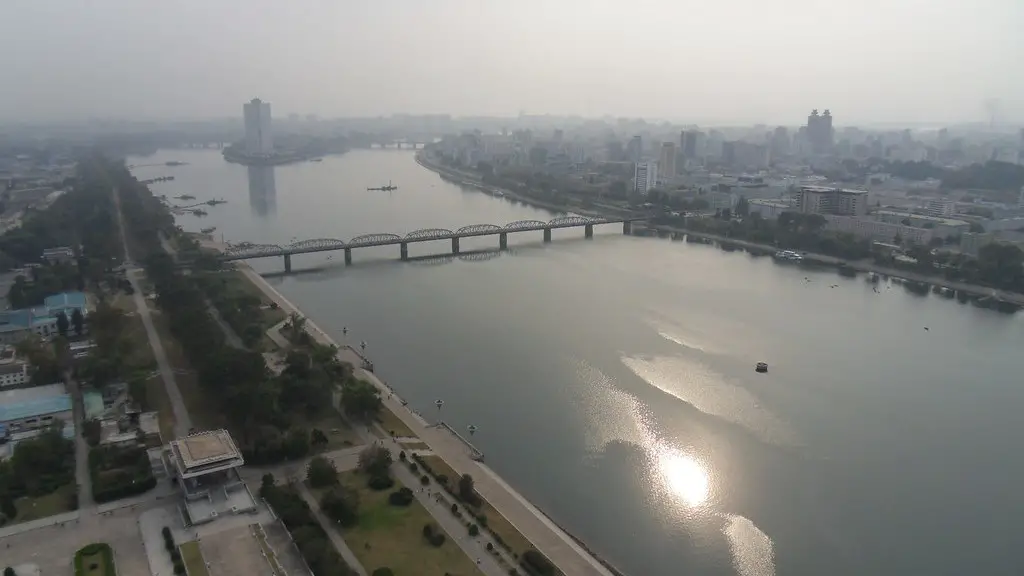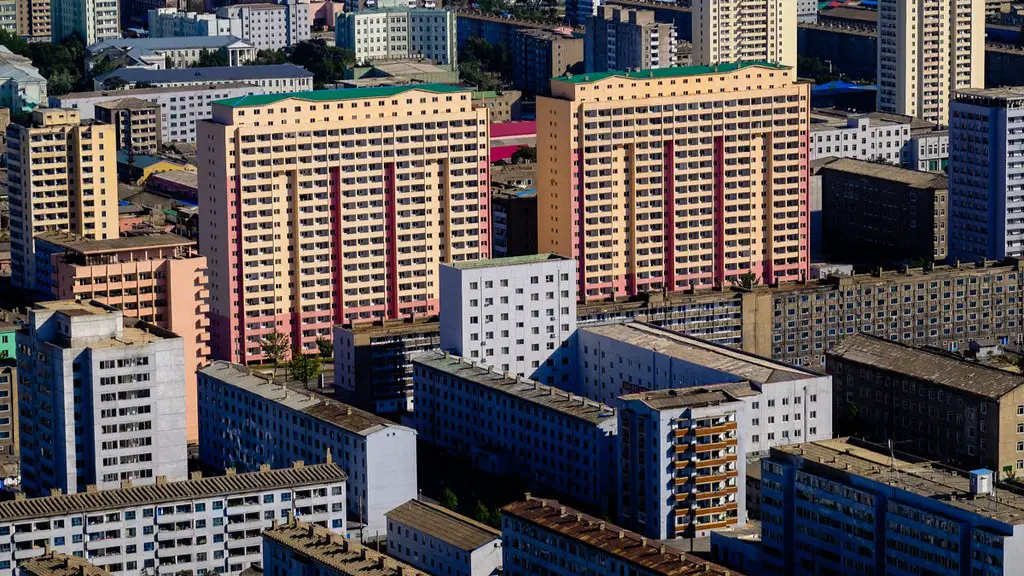The Why Behind North Korea’s Attack on South Korea
We have all heard of the Korean War, which occurred between 1950-53. But why did it happen in the first place? Why did North Korea attack South Korea after being divided during the Cold War? The answer to these questions goes back to the Korean War, a conflict that still shapes the relationship between North and South Korea today.
The Korean War began when North Korea, supported by the Soviet Union, invaded South Korea on June 25, 1950. The North Korean People’s Army had grown rapidly and was determined to reunite the divided Korean peninsula under their leadership. North Korea attacked South Korea because of their ideological differences, as well as a desire to gain control over the peninsula.
At the time, North Korea was heavily influenced by communism, while South Korea had adopted a capitalist government that was closely aligned with the United States. The North Korean government had frequently warned the South about the consequences of its alliances and economic policies, accusing it of creating an atmosphere of “American neo-colonialism”. Furthermore, North Korean leaders felt that their government was better equipped to unify the Korean peninsula since they had much greater support from the Soviet Union than South Korea did from the US.
When the North Korean army crossed the 38th parallel and launched their attack on June 25, 1950, they did so in an effort to gain control over the peninsula. The North Korean army’s goal was to reunify the peninsula under their own rule, as they saw it as more ideologically pure than the government in Seoul. North Korea also wanted to prevent South Korea from having any sort of contact with the US or other Western countries.
In the end, however, North Korea’s plans failed. The US and the United Nations stepped in to aid South Korea, and three years and millions of lives later, the Korean War ended in an armistice rather than a unified peninsula. After the conclusion of the war, the US-backed South Korea continued to go its own way, while North Korea remained in a state of isolation.
The Korean War was a major event in the Cold War, and its long-reaching effects are still felt today. North and South Korea continue to be divided by a heavily fortified border and mistrust of each other. It also serves as a reminder of the devastating consequences of war and how difficult it is to reverse the divisions it creates.
Economic Influences and Disparities Between North and South Korea
The North Korean economy, despite subsidies from China and Russia, has not been able to keep up with the thriving economy in South Korea. South Korea has seen a steady rise in GDP over the years, while North Korea’s has remained stagnant. This economic disparity has caused a deep rift between the two countries that can’t seem to be bridged. North Korean leaders have expressed repeated displeasure over the economic differences between the two states and have accused the South of exploiting its citizens and oppressing the North through asymmetrical economic policies.
In recent years, North Korea has focused its efforts on becoming a nuclear power in order to compete with its wealthier neighbor. In 2006, North Korea conducted its first nuclear test and has since launched several more, despite international condemnation. They have repeatedly threatened to use nuclear weapons against South Korea and the US, as a way to seek revenge for their defeat in the Korean War.
The North Korean government has been accused of countless human rights violations, including the brutal punishment of dissenters in its prisons. UN investigators have documented numerous accounts of torture and forced labor, as well as the repressive tactics used by the government to silence any opposition. Additionally, the North Korean government has been accused of oppressing its people by denying them basic necessities such as food and medical care.
The economic disparities between North and South Korea are largely responsible for the mistrust between the two countries. The North Korean government sees its economic woes as a direct result of South Korea’s economic success, while South Korea sees North Korea’s nuclear ambitions as an attempt to inform power and a threat to its own national security.
Global Power Dynamics Reflect Korea’s Division
The relationship between the two Koreas is also shaped by the global power dynamics. China and the US have both provided military and economic aid to the countries, but their goals have often been at odds. American forces maintain a large military presence in South Korea, and the US has repeatedly indicated its willingness to use preemptive force in the region if necessary. Meanwhile, China has provided North Korea with significant economic and military aid, including resources for its nuclear weapons program.
In addition, the US and other world powers have imposed a number of economic sanctions on North Korea in an effort to stop their nuclear ambitions. The sanctions have not been successful in deterring North Korea from pursuing nuclear weapons, but they have taken a toll on the country’s already fragile economy. Many North Korea experts believe that these sanctions have been a major factor in the country’s increasingly hostile behavior.
The US and other countries have tried to use diplomacy to resolve the conflict, but have been largely unsuccessful. North Korea’s belligerent attitude and its continued development of nuclear weapons have caused some world leaders to question the usefulness of negotiating with the country. However, others have argued that aggressive economic sanctions and military threats are not the solution, and instead suggest working to build trust and mutual understanding between the two sides.
Current Tensions Between North and South Korea
The relationship between North and South Korea has fluctuated over the years, with periods of relative calm followed by periods of increased tensions and provocations. In 2018, however, the two countries made a historic breakthrough when North Korean leader Kim Jong-un and South Korean President Moon Jae-in held a summit in April. The two leaders agreed to work towards denuclearizing the Korean peninsula and creating lasting peace. The summit was seen as a major breakthrough and a sign that the two countries had turned a corner in their relationship.
In the months that followed, however, tensions began to rise again. North Korea resumed its nuclear and missile tests, while South Korea accused the North of violations of the armistice agreement. The two countries have once again been locked in a cycle of escalating tensions and provocations, raising fears that the 2018 summit may have been a fleeting moment, and raising questions of whether the two countries could ever reconcile their differences and live together in peace.
Today, the conflict between North and South Korea remains unresolved, and the two sides remain separated by a heavily fortified border with no end in sight. There have been occasional efforts to reduce tensions, and both sides have expressed a commitment to denuclearizing the Korean Peninsula, but progress has been slow and, at times, nonexistent. The Korean War continues to loom large over the peninsula, and while it’s unlikely that North Korea will ever launch a full-scale invasion of South Korea again, the tension between the two sides remains ever present.
Impact of the Korean War on Global Politics
The Korean War has also had a profound impact on global politics and the Cold War more generally. It was the first major conflict of the Cold War, and it set the tone for the decades-long conflict between the US and the Soviet Union. By the late 1950s, both sides were heavily armed and ready for war, and the Korean War served as a constant reminder of the dangers of the Cold War era. The conflict also resulted in the death of millions of soldiers and civilians, as well as a devastating toll on the environment.
The Korean War also shaped the international community’s attitude towards North Korea. In the years since the war, North Korea has been largely treated as an international pariah. North Korea is under sanctions from the United Nations, and is often the target of criticism from human rights groups and other countries. The US and other world powers have tried to use economic sanctions and military pressure to curb North Korea’s nuclear ambitions, but have so far been unsuccessful. The Korean War continues to loom large over the peninsula, and will likely have an impact on the relationship between North and South Korea for many years to come.
Conclusion
The Korean War was a major event that had a lasting impact on both North and South Korea. North Korea’s invasion of South Korea in June 1950 was a result of the ideological differences between the two states, as well as a desire to gain control over the peninsula. The war ended in 1953 with an armistice, not a unified peninsula, and this division has been a source of tension between the two sides ever since. North Korea continues to be heavily sanctioned, and South Korea remains one of the most prosperous countries in the world. Today, the two sides remain distant, but there is a faint hope for peace on the peninsula.




